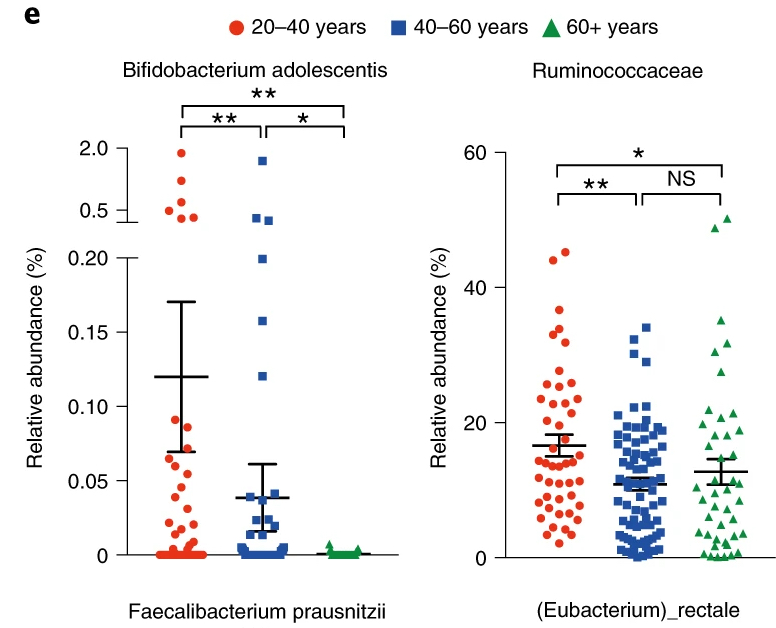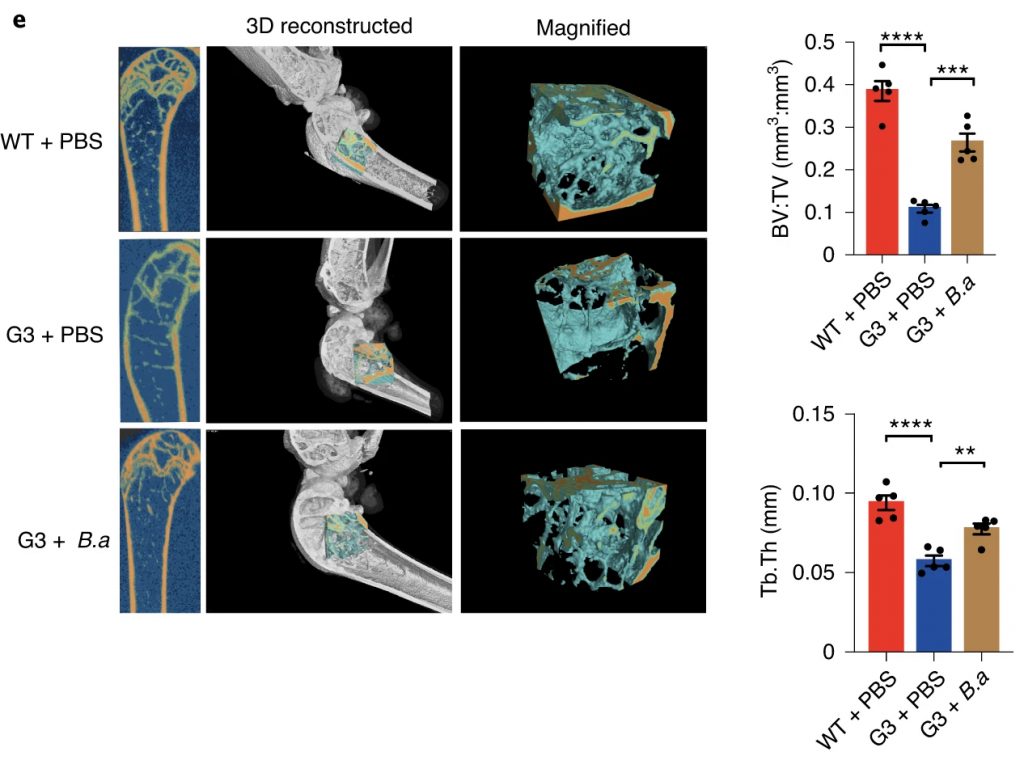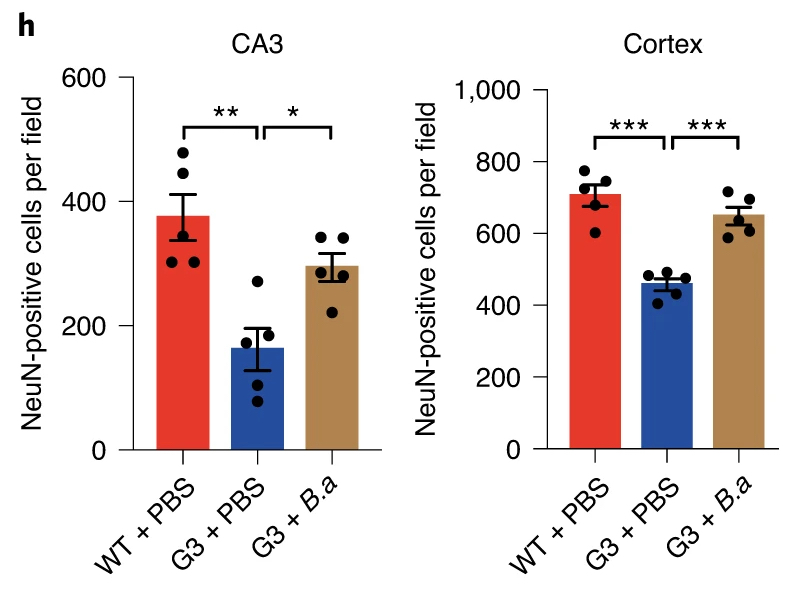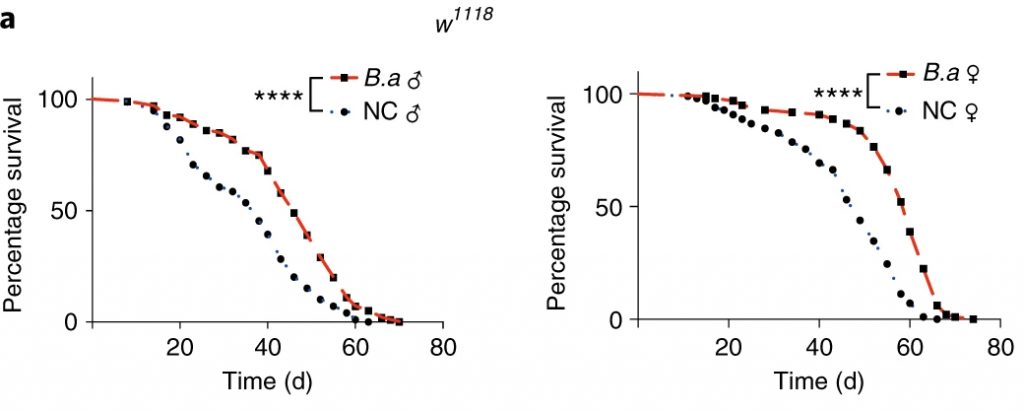Highlights:
- A species of gut bacteria called B. adolescentis declines with aging in humans.
- Supplementation with B. adolescentis reverses osteoporosis, neurodegeneration, and other age-related conditions in mice.
- B. adolescentis could potentially be used as a probiotic to slow down the process of aging.
Trillions of microscopic organisms live within our gut. Most of these microorganisms are bacteria, and many are associated with the aging process and age-related diseases. Still, it is unclear exactly which gut bacteria affect aging and how they do so.
As reported in Nature Aging, Chen and colleagues from Zhejiang University School of Medicine in China linked a gut bacteria species called B. adolescentis to aging reversal. When supplemented with B. adolescentis, mice saw improvements in age-related osteoporosis and neurodegeneration while fruit flies and worms had increases in lifespan and healthspan – the amount of time lived in good health. These results are very encouraging for microbiome-based longevity interventions and suggest that B. adolescentis is a promising probiotic.

B. adolescentis Has Anti-Aging Effects in Aged Mice
By analyzing the bacteria from the fecal samples of 166 participants from three age groups (20-40 years, 40-60 years, and 60+ years), Chen and colleagues found that B. adolescentis declined the most with age. Like humans, aged mice had lower levels of gut B. adolescentis. But when aged mice were supplemented with B. adolescentis, their body weight increased and frailty decreased, demonstrating that B. adolescentis can reverse aspects of aging.
Aging is characterized by the dysfunction of multiple organs, including the brain, muscle, and bone. Osteoporosis is an age-related disease that disrupts the structural integrity and decreases the size of bones, making them brittle. Chen and colleagues found that signs of osteoporosis in aged mice, like reduced bone mass, were reversed by B. adolescentis supplementation, again demonstrating that B. adolescentis reverses aspects of aging.

In addition to osteoporosis, aged mice show signs of neurodegeneration, and research has shown that gut bacteria influence the onset of age-related neurodegenerative disease, which involves neurons’ deterioration and eventual death. Chen and colleagues found that giving the aged mice B. adolescentis decreased signs of neurodegeneration, demonstrating that B. adolescentis reverses multiple aspects of aging in mice.

B. adolescentis Is an Anti-oxidant and Anti-inflammatory
Chen and colleagues gave B. adolescentis to two organisms frequently used to study aging – fruit flies and worms – to verify its effect on lifespan and healthspan. Supplementation with this probiotic increased lifespan by 20% in fruit flies and enhanced climbing ability, a vital indicator of health and fitness. B. adolescentis also improved the lifespan and healthspan (ability to move and resist deadly heat levels) of worms.

The data from multiple organisms (flies, worms, and mice) suggest that B. adolescentis slows down aging by regulating catalase, an enzyme that reduces oxidative stress. Furthermore, the Chinese researchers found elevated metabolites with proinflammatory properties and metabolites associated with cardiovascular disease in aged mice not given B. adolescentis, suggesting that the probiotic reduces inflammation. Overall, B. adolescentis may slow aging by increasing catalase and other metabolites associated with reducing oxidative stress and inflammation.
Can B. adolescentis Be Used as a Probiotic?
The findings of Chen and colleagues demonstrate that B. adolescentis can reverse various aging conditions by regulating oxidative stress and inflammation. These findings suggest that the probiotic can combat age-related diseases, like Alzheimer’s and cardiovascular diseases. Based on these findings, the authors hypothesize that probiotics could regulate age-related disorders by reducing gut inflammation and regulating the host metabolism.
Probiotics are living microorganisms like bacteria that promote quality of life. More research in humans may be required, but the findings of Chen and colleagues place B. adolescentis as a potential candidate for a probiotic that can slow down the process of aging. The results also highlight the importance of gut bacteria in health and aging and how other probiotics could mitigate age-related disease and improve quality of life throughout the aging process.